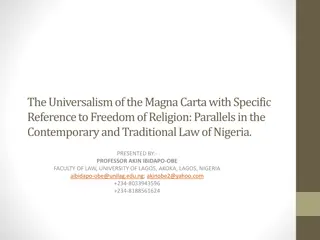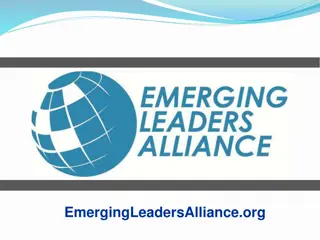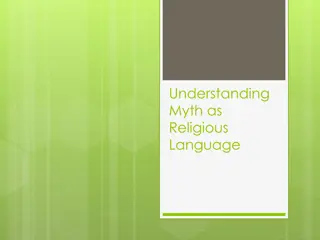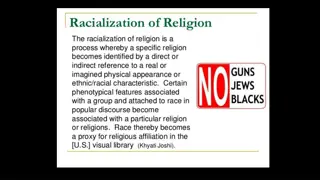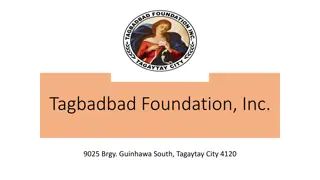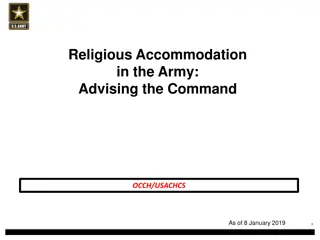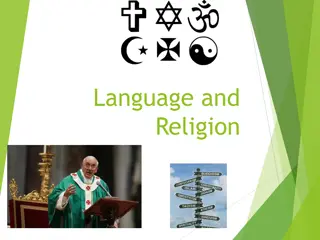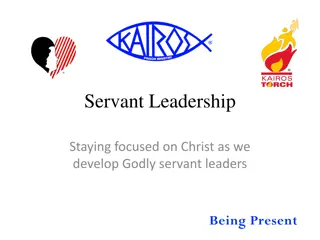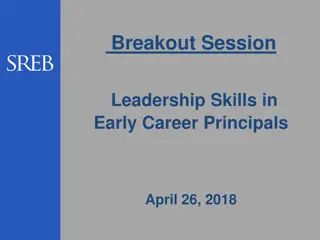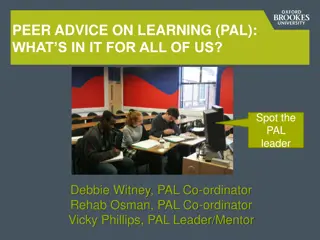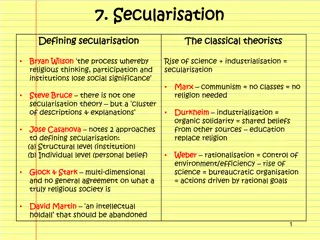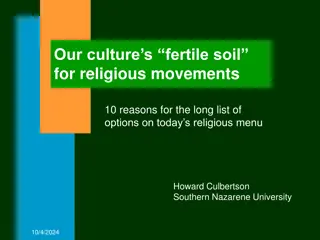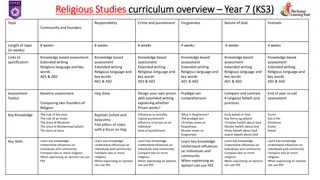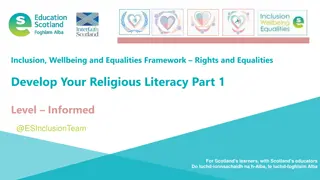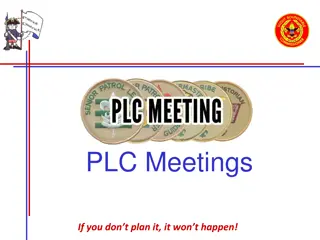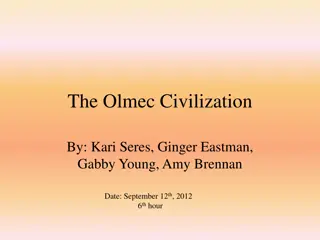Understanding Interfaith Harmony in Islamic Education
The third meeting conducted by the Islamic Education Faculty covered topics such as classroom regulations, tolerance among different religions, the concept of harmony among religious communities, and general challenges related to diversity in religious interpretations. The importance of maintaining
2 views • 13 slides
Status of Family Laws in India: Hindu vs. Religious Minorities
The family and personal status laws in India vary between Hindu law and those pertaining to religious minorities. While Hindu law has seen extensive reforms, discriminatory provisions still exist. In contrast, laws governing religious minorities have undergone fewer reforms, leading to greater inequ
2 views • 4 slides
The Universalism of Magna Carta: Freedom of Religion in Contemporary Nigerian Law
Magna Carta, a pivotal human rights document, is explored with a focus on its religious underpinnings and its influence on modern legal systems. The parallels and divergences between Magna Carta and Nigerian customary law regarding freedom of religion are examined. The implications of contemporary N
0 views • 16 slides
Religious Education Skills Progression for Years 5 and 6
This document outlines the long-term plan for the RE curriculum for Year 5 and 6 students, focusing on topics such as living by Christian values, exploring wisdom from different faiths, understanding the creation of the world, and expressing faith through art. It also covers the progression of skill
0 views • 31 slides
Emerging Leaders Alliance - Empowering Engineering and Scientific Leaders
The Emerging Leaders Alliance (ELA) is a collaborative effort of engineering societies providing leadership training for emerging leaders. Supported by the United Engineering Foundation, the ELA program aims to develop a new generation of engineers equipped with both technical and non-technical skil
0 views • 11 slides
Religious Policies of Queen Elizabeth I: Seeking a Middle Way
Queen Elizabeth I of England navigated religious turmoil by establishing a middle way that balanced Protestant and Catholic elements. Her reign saw the passing of acts like the Act of Supremacy and Act of Uniformity to consolidate her power and create a distinct Church of England. Despite facing opp
0 views • 21 slides
Understanding Religious Conflict: Definition and Types Explored
Religious conflict is a complex and recurring concept throughout history. Scholars have defined it as disagreements between religious groups. This conflict arises from contentious issues touching on ideology, morality, power, and identity, influenced by various socio-political, economic, and cultura
1 views • 13 slides
Understanding Myth as Religious Language: Exploring Concepts and Interpretations
Explore the multifaceted nature of myths as religious language, delving into their equivocal definitions, truth claims about God, and use of rhetorical devices. Discover the significance of myths in providing human understanding of God, revealing divine attributes, and addressing fundamental questio
0 views • 17 slides
Overview of Religious Studies Course at Ramsey Grammar School
The Religious Studies course at Ramsey Grammar School for Year 9 students covers topics such as Christianity, Islam, Life and Death, Good and Evil, beliefs, practices, and church diversity. Students will be assessed through a written examination at the end of Year 11, with no coursework requirement.
0 views • 23 slides
Evolution of Akbar's Religious Policy: A Historical Overview
In the 16th century, Akbar the Great implemented a revolutionary religious policy in the Mughal Empire. Initially a devout Sunni Muslim, Akbar evolved his stance to promote harmony and equality among all religions, fostering tolerance and understanding. This shift marked a significant departure from
0 views • 25 slides
Embracing Religious Pluralism for a Harmonious Society
Educate yourself on world religions and religious oppression, empathize with religious minorities, combat generalizations, and promote belief inclusion in all aspects of life for a more just and peaceful world.
0 views • 6 slides
Empowering Kingdom Leaders: Our Vision and Mission at Dominion House
Dominion House, home of Kingdom leaders in the Fire Nation, is a disciple-making movement focused on raising empowered leaders and establishing home churches for transformational discipleship. Our foundational scriptures guide our path, emphasizing the knowledge of God's glory and the calling to mak
2 views • 24 slides
Elizabethan Religious Settlement: Unity Amidst Division
Amid religious division in England, Queen Elizabeth I implemented a Religious Settlement in 1559 to unify the country. The settlement, a blend of Protestant and Catholic elements, aimed to maintain peace and prevent rebellions. Elizabeth's strategic compromise pleased most people, though lingering t
0 views • 14 slides
Understanding Secularism: Principles and Advantages
Secularism is the principle of separating government institutions from religious entities to ensure equal rights for believers and non-believers. It safeguards freedom of religious belief and practice, upholds religious freedom, and promotes democracy and fairness. Secularism aims to prevent religio
0 views • 21 slides
Benefits of Apprenticeship Programmes for School Leaders
Apprenticeship programmes offer school leaders valuable training while they work towards nationally recognized standards. Best Practice Network provides dual qualification programmes combining apprenticeships with NPQs to enhance leadership skills in the education sector. With over 750 school leader
1 views • 21 slides
Tagbadbad Foundation, Inc.: Providing Renewal Programs for Church Leaders
Tagbadbad Foundation, Inc. is a non-profit religious organization focusing on providing quality and affordable renewal programs and trainings for bishops, priests, male/female religious, formands, and laity. Their offerings include developmental renewal programs like Training on Celibate Living, aim
0 views • 23 slides
Understanding Religious Language: Cognitivism vs. Non-Cognitivism in the University Debate
This discussion explores the debate between cognitivism and non-cognitivism in religious language. Cognitivism asserts that religious claims aim to describe the world and can be true or false, while non-cognitivism argues that such claims express attitudes and cannot be verified. Flew's challenge qu
0 views • 9 slides
Guide to Using the BSA Calendar of Religious Observances
The BSA Calendar of Religious Observances is a valuable resource for scheduling scouting events in consideration of various religious holidays and observances. This guide provides an overview of the calendar, highlights important dates, and emphasizes the importance of respecting religious diversity
0 views • 8 slides
Religious Accommodation Guidelines in the Army
Advising the command on religious accommodation in the Army involves understanding federal laws, DOD policies, and procedures. This includes locating and applying relevant laws, regulations, and doctrine, such as the Religious Freedom Restoration Act and Army Directives. Changes in the process impac
0 views • 36 slides
Understanding the Role of Language in Religion
Exploring the significance of language in religious contexts, this content discusses the functions, features, lexicon, grammar, and metaphorical aspects present in religious language. It delves into how religious language upholds spiritual beliefs, persuades believers, and expresses specific attitud
0 views • 8 slides
Understanding the Cultural Dimensions of Food and Religious Influences in Culinary Arts
Explore the impact of religious beliefs on food traditions and dietary restrictions across different cultures in the culinary world. Learn about the influence of major world religions on eating habits, food choices, and culinary practices. Discover how various religious groups, such as Christians, o
0 views • 26 slides
Embracing Servant Leadership in Developing Godly Leaders
Explore the essence of servant leadership, centered on Christ, focusing on humility, empowerment, and nurturing others. Learn from examples like Jesus, John the Baptist, and the temptations faced by leaders. Discover key habits and characteristics of servant leaders, and consider how to identify and
0 views • 9 slides
The Vital Role of Religious Institutions in Supporting Immigrants
Religions and immigration are interlinked in modern societies, where religions play a significant role in providing services, defending rights, and supporting the social cohesion of immigrants. Mainstream religious institutions serve as key actors in offering assistance, advocating for migrant right
2 views • 14 slides
Florida Turnaround Leaders Program: Developing Effective School Leaders
The Florida Turnaround Leaders Program (FTLP) aims to prepare leaders for challenging school environments by developing essential skills and strategies. Led by a team of experienced presenters and consultants, the program focuses on building leadership capacity, refining turnaround skills, and provi
0 views • 10 slides
Understanding Religious Language: Flew, Hare, Mitchell
Exploring the contrasting views of cognitivism and non-cognitivism in the context of religious language through the perspectives of Flew, Hare, and Mitchell. Delve into Flew's challenge on the undetectable gardener, Hare's concept of bliks, and Mitchell's response to the rationality of religious bel
0 views • 7 slides
Exploring the Benefits of Peer Advice on Learning (PAL) Leadership
The role of PAL leaders in student engagement and learning outcomes is highlighted through testimonials from PAL leaders themselves. PAL leaders promote collaborative learning, knowledge sharing, and enhanced understanding of academic modules, leading to improved grades and student confidence. The p
0 views • 16 slides
Religious Accommodation in the Army: Advising Command
The content discusses the role of the Chaplain Corps in advising Soldiers and leaders on religious accommodation in the Army as of February 13, 2019. It covers learning objectives, legal foundations, Army policies, procedures, recent changes, and references related to religious accommodation. The in
0 views • 36 slides
Understanding Religious Discrimination Laws in California Workplace
Learn about the regulations and protections under FEHA and Title VII in California, including religious exemptions, accommodation requirements, case studies, and best practices to address discrimination issues effectively. Discover the statistical insights on religious discrimination complaints and
0 views • 45 slides
Global Matrix 4.0 Spanish Report Card Leaders Meeting Overview
The Global Matrix 4.0 Spanish Report Card Leaders Meeting provides insights into national and regional report cards, introduction of Spanish leaders, and discussions on national coordination and future opportunities for various regions. The meeting aims to harmonize messaging, share information, and
0 views • 9 slides
Understanding Secularisation: The Decline of Religious Influence in Society
Secularisation refers to the process in which religious thinking, participation, and institutions lose their social significance. This phenomenon is influenced by factors such as the rise of science, industrialisation, changing social attitudes, and the disengagement of the church from society. Evid
0 views • 8 slides
Philosophers' Views on Religious Experience: Insights and Critiques
This lesson delves into the perspectives of various philosophers such as Rudolph Otto, Richard Swinburne, John Hick, and Michael Persinger on religious experiences. It explores concepts like the numinous, religious knowledge, God's existence, and criticisms on the validity of religious experiences.
0 views • 7 slides
Philosophers' Views on Religious Experience: Insights from William James
Explore William James' perspective on religious experiences, including his views on existential and value judgments. Understand how James argued for the validity of religious experiences and their potential proof of God's existence. Delve into the implications of emotions and prior beliefs on interp
0 views • 7 slides
Religious and Social Conflicts Fueling the Rise of Absolutism in Europe
Social, economic, and religious conflicts in Europe played a significant role in the emergence of absolutism where monarchs wielded supreme power without sharing it with legislative bodies. Events like Spain's religious conflicts, Protestantism in England, the Spanish Armada, religious conflict in t
0 views • 10 slides
Religious Pluralism and Civil Society: A Paradox in Government Control
Understanding the intricacies of religious pluralism in the context of government control reveals a paradox where restricting religion can hinder social cohesion and economic growth. Through insights on the counterproductivity of control, the role of religious organizations in civil society, and the
0 views • 16 slides
US Religious Freedom Restoration Act (RFRA) Overview
The US Religious Freedom Restoration Act (RFRA) aims to protect the free exercise of religion by ensuring that governments do not substantially burden religious practices without compelling justification. It emphasizes striking a balance between religious liberty and governmental interests through t
0 views • 9 slides
Understanding the Fertile Ground of Cultural Influences on Religious Movements
Cultures provide fertile soil for diverse religious movements due to various factors such as secularism, existential uncertainties, disillusionment with leaders, and a deep human longing for transcendence. Other contributing factors include breakdown of traditional social structures, moral relativis
0 views • 13 slides
Religious Studies Curriculum Overview for Year 7 and 8 (KS3)
Explore various topics such as responsibility, crime and punishment, forgiveness, nature of God, festivals, community, founders, worship, creation, life after death, rules and laws, relationships in this detailed Year 7 and 8 (KS3) Religious Studies curriculum. The curriculum includes assessments, e
0 views • 6 slides
Developing Religious Literacy for Educators in Scotland
This resource aims to enhance educators' understanding of religious literacy by exploring religious discrimination, core beliefs of major faiths, and additional learning sources. It encourages educators to consider the needs of learners in relation to their religious beliefs in Scotland.
0 views • 30 slides
Effective Planning for Patrol Leaders' Council (PLC) Meetings
Patrol Leaders' Council (PLC) meetings in the Boy Scouts of America are crucial for planning troop activities. The senior patrol leader, assistant senior patrol leader, patrol leaders, and troop guide work together to organize the troop program. Proper structure, content, planning, and preparation a
1 views • 5 slides
Exploring the Olmec Civilization: Origins, Culture, and Legacy
The Olmec Civilization, considered the mother civilization of Mesoamerica, emerged from competing chiefdoms where rulers served as religious leaders. They thrived in agriculture, building mounds, pyramids, and temples. Their religious practices included mound building, bloodletting, and ritual sacri
0 views • 20 slides


